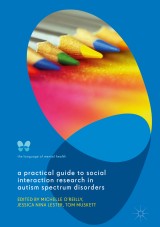Details

A Practical Guide to Social Interaction Research in Autism Spectrum Disorders
The Language of Mental Health
|
139,09 € |
|
| Verlag: | Palgrave Macmillan |
| Format: | |
| Veröffentl.: | 16.11.2017 |
| ISBN/EAN: | 9781137592361 |
| Sprache: | englisch |
Dieses eBook enthält ein Wasserzeichen.
Beschreibungen
This book introduces a novel approach for examining language and communication in autism spectrum disorder (ASD) - discourse and conversation analysis. The authors offer a set of very different perspectives on these complex issues than are typically presented in psychological and clinical work. Emerging from a range of social scientific fields, discourse and conversation analysis involve fine-grained qualitative analysis of naturally-occurring, rather than laboratory-based, interaction, enabling broad applications. <div><br></div><div>Presented in two parts, this innovative volume first provides a set of pedagogical chapters to develop the reader's knowledge and skills in using these approaches, before moving to showcase the use of discursive methods through a range of original contributions from world-leading scholars, drawn from a range of disciplines including sociology, academic and clinical psychology, speech and language therapy, critical disability studies and social theory, and medicine and psychiatry.</div>
<div><div>Chapter 1. Autism Spectrum Disorder: An introduction; Karim.- Chapter 2. Social constructionism, Autism Spectrum Disorder and the discursive approaches; O’Reilly and Lester.- Chapter 3. Naturally occurring data versus researcher generated data; Lester, Muskett, & O’Reilly.- Chapter 4. Using conversation analysis to assess the language and communication of people on the autism spectrum: A case-based tutorial; Muskett.- Chapter 5. Understanding the autistic individual: A practical guide to discourse analysis; Charlotte Brownlow, Lindsay O’Dell & Tanya Machin.- Chapter 7. How to use research supervision in the development of a discursive psychology or conversation analysis project to study Autism; Smart and Denman.- PART II.- Chapter 8. The interaction is the work: rehabilitating risk in a forensic patient with Autism Spectrum Disorder and Learning Disability; Dobbinson.- Chapter 9. Children’s use of I don’t know during clinical evaluations for autism spectrum disorder: responses to emotion questions; Stickle, Duck, and Maynard.- Chapter 10. Discursive methods and the cross-linguistic study of ASD: A conversation analysis case study of repetitive language in a Malay-speaking child; Mohamed Zain, Muskett and Gardner.- Chapter 11. Conversation Analysis: A tool for analysing interactional difficulties faced by children with Asperger’s syndrome; Rendle-Short.- Chapter 12. Animating characters and experiencing selves: a look at adolescents with autism spectrum disorder constructing fictional storyboards with typically developing peers; Bottema-Beutel, Sterponi, & Louick.</div></div><div><br></div>
<div><b>Michelle O’Reilly</b> is a Senior Lecturer for the Greenwood Institute of Child Health at the University of Leicester, and Research Consultant for Leicestershire Partnership NHS Trust. Michelle’s research interests are broadly in child mental health, family therapy, and the sociology of health and illness. </div><div><br></div><div><b>Jessica Nina Lester</b> is an Assistant Professor of Inquiry Methodology in the School of Education at Indiana University, USA. She teaches research methods courses, including discourse analysis, with much research focused on the study and development of qualitative methodologies and methods. </div><div><br></div><div><b>Tom Muskett</b> is a Senior Lecturer in Psychology at Leeds Beckett University, UK. He has worked in clinical and educational roles with children with diagnoses of autism and their families, and previously led a clinical training programme at the University of Sheffield, UK<b>. </b></div><div><br></div><div><div><br></div></div>
This book introduces a novel approach for examining language and communication in autism spectrum disorder (ASD) - discourse and conversation analysis. The authors offer a set of very different perspectives on these complex issues than are typically presented in psychological and clinical work. Emerging from a range of social scientific fields, discourse and conversation analysis involve fine-grained qualitative analysis of naturally-occurring, rather than laboratory-based, interaction, enabling broad applications. Presented in two parts, this innovative volume first provides a set of pedagogical chapters to develop the reader's knowledge and skills in using these approaches, before moving to showcase the use of discursive methods through a range of original contributions from world-leading scholars, drawn from a range of disciplines including sociology, academic and clinical psychology, speech and language therapy, critical disability studies and social theory, and medicine and psychiatry.<br><p></p>
Highlights the economic consequences of a disabling culture Aims to layer and complicate the discussions that surround autism in schools, health clinics and society Illustrates social construction of autism in educational and historical discourses
“The contributors to this welcome book make a strong case, backed up by vivid examples, for the usefulness of very close analysis of the language and behaviour of people with autism spectrum disorder, and the people around them. As a lively record of the state of the art, it will be an invaluable guide to students and researchers.” (Charles Antaki, Loughborough University, UK)<p></p>
Diese Produkte könnten Sie auch interessieren:

Der gesundheitspolitische Stellenwert der Tiergestützten Therapie in Deutschland

von: Nadine Kahlert

13,99 €















